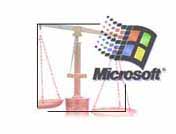|
Microsoft, U.S. to talk
|
 |
September 28, 2001: 4:32 p.m. ET
Judge orders both sides to try for a negotiated settlement
|
NEW YORK (CNNfn) - The federal judge presiding over the next phase of Microsoft's antitrust case Friday ordered the software maker and the U.S. Justice Department into five weeks of intensive settlement talks.
During their first appearance before U.S. District Court Judge Colleen Kollar-Kotelly, she told attorneys for Microsoft and the Justice Department that now is an "optimal time" to settle the case out of court and that they could strike a deal "if everybody is reasonable and acting in good faith."
Kollar-Kotelly said such settlement talks should proceed "24 hours a day, seven days a week," and set a deadline of Nov. 2.
|

|
VIDEO
|
|
 CNNfn's Steve Young reports from Washington on court-ordered settlement talks CNNfn's Steve Young reports from Washington on court-ordered settlement talks |
|
Real
|
28K
|
80K
|
|
Windows Media
|
28K
|
80K
|
|
If there is no settlement by then, Kollar-Kotelly said a hearing on what steps to take to curb Microsoft's abuses of antitrust law would start in March 2002. The judge ordered an expedited schedule, much faster than the one Microsoft had proposed earlier this month.
Kollar-Kotelly made it clear that she disagrees with Microsoft's contention that she has limited power to impose remedies on Microsoft's conduct, saying Supreme Court rulings clear the way for her to do whatever is necessary to prevent not just past violations but also future violations of the law.
After the order, the Microsoft legal team left the court house quickly without comment.
On June 28, the U.S. Court of Appeals for the District of Columbia overturned a lower court's ruling that Microsoft be broken into two companies as a remedy for anticompetitive practices and remanded other parts of the judge's decision back to the lower court for consideration by a different judge.

|
|
|
Click here for CNNfn.com's special report: Microsoft on trial | |
At the same time, the appeals court upheld the lower court's conclusion that Microsoft had a monopoly in the market for computer operating systems and maintained that monopoly illegally.
The Justice Department already has said it will not pursue a breakup, choosing instead to seek court-ordered changes to the way the software maker conducts business, similar to those Judge Jackson imposed when he handed down his original ruling but were postponed pending the appeal.
Since the appeals court first handed down its ruling in the case, Microsoft repeatedly has expressed a willingness to settle the case out of court. And while none of the parties involved has acknowledged them, there reportedly have been discussions toward that end.
"Both sides need to face the reality that this is probably their last best chance to craft something that's not imposed by the courts," said Andy Strenio, an antitrust lawyer with Powell Goldstein Frazier & Murphy. "That's a risky roll of the dice -- to leave it in the hands of the judiciary."
Any settlement is likely to involve Microsoft's newest operating system, Windows XP, also has come under scrutiny since the appeals court's ruling. The new product, which some PC makers already are offering on new systems and is expected to be officially released Oct. 25, incorporates features such as instant messaging, streaming media and digital imaging capabilities into the operating system.
It has been targeted by Microsoft's foes, as well as some government officials, who say it demonstrates further anticompetitive practices because rival companies offer those software features separately.
Kollar-Kotelly was assigned to the case because the appeals court deemed Judge Thomas Penfield Jackson, the original trial judge, had violated ethical guidelines by making certain comments about the case publicly.
Microsoft (MSFT: up $1.21 to $51.17, Research, Estimates) shares closed up more than 2 percent on Nasdaq Friday. 
|
|
|
|
|
 |

|

